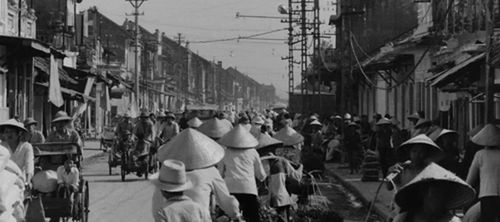Remembering the Second Indochina War

2025 marks the 50th anniversary of the end of the Second Indochina War, popularly known as the Vietnam War. The war has left indelible impacts on the lives of many across the world, including those living in Vietnam, Laos, Cambodia, the United States, and European countries. This event features a roundtable of scholars and practitioners reflecting on the diverse histories, lived experiences, and postwar national and international recovery efforts following the war.
Kevin Pham discusses the colonial history leading up to the Second Indochina War and the competing visions of postcolonial nation-building. Rimko van der Maar and Stephanie Benzaquen-Gautier shed light on the experiences of people embroiled in the war, yet often neglected in the rich scholarly literature of the war, namely Dutch anti-war activists and refugees at the Cambodia-Vietnam border. Tam Ngo and Andreas Kleiser discuss one of the central postwar recovery efforts, namely the recent national and international endeavours to search for and identify missing-in-action soldiers. The roundtable is moderated by Dat Nguyen. Together, the roundtable participants will shed light on the complex history and experiences of the war, especially from the perspectives that complement and complicate the present focus on Vietnam-US experience during this important commemoration of the war.
About the speakers
Kevin Pham is an Assistant Professor of Political Theory at the University of Amsterdam. He is the author of The Architects of Dignity: Vietnamese Visions of Decolonization (Oxford University Press, 2024). His parents were refugees from Vietnam, and he was born and raised in San Jose, California. He has lived in and frequently travels to Vietnam and France. He co-hosts two podcasts about Vietnamese intellectual history: Nam Phong Dialogues and Viet History Makers.
Stephanie Benzaquen-Gautier is a visual historian. She is an affiliate research fellow at the International Institute for Asian Studies (IIAS) in Leiden and a 2023 CKS Senior Fellow at the Center for Khmer Studies (Cambodia). Her work explores violence, archive, memory and activism in Cambodia. She is currently working on Before Year Zero, a monograph on the Khmer Republic (1970-1975). Her co-edited volume Tuol Sleng Genocide Museum: A Multifaceted History of Khmer Rouge Crimes was published in 2024 (Brill).
Rimko van der Maar is an Assistant Professor in History of International Relations at the University of Amsterdam. His dissertation (Utrecht University 2007) covers the Netherlands and the Vietnam War. He specialises in the history of Dutch diplomacy and foreign relations, particularly during the Cold War, and in Third World solidarity movements from the 1950’s to 1970’s. His new book, In de ban van Vietnam. De Vietnamese onafhankelijkheidsstrijd en het Westen is written for a broad Dutch audience and discusses North and South Vietnamese propaganda strategies during the Vietnam War.
Andreas Kleiser has worked in the field of international cooperation since 1995, initially as an executive officer in the General Secretariat of the Council of Europe. He advised the International Commission of Missing Person (ICMP) in 2001 on the establishment of the Missing Persons Institute of Bosnia and Herzegovina, joined the organisation as Senior Advisor in 2003, and was appointed Deputy Chief of Staff in 2005 and Director for Policy and Cooperation in 2006. Andreas has negotiated numerous cooperation and other agreements between ICMP and intergovernmental and other organisations, and he oversees ICMP’s assistance to domestic and international justice institutions, including, during its mandate, the International Criminal Tribunal for the Former Yugoslavia. Andreas obtained his law degrees from the University of Konstanz, Germany, and from the University of San Diego School of Law, California.
Tam Ngo is a senior researcher at the NIOD, studying processes of social healing, environmental reparation, and reconciliation politics through the interactive lens of religion and science. Her research examines a wide range of ethnographic settings from postwar Vietnam, Vietnamese diasporas in Europe, Hmong refugees in the US and Vietnamese Chinese refugees in China, to different circles of DNA forensic experts working on human identification and the genetic and ecological destruction of the Vietnam War. She is the author of The New Way: Protestantism and the Hmong in Vietnam. She co-edited the double special issue ‘Actions for the Missing: Scientific and Vernacular Forms of War Dead Accounting’, which includes her own single-author article, ‘The Tombs of Wind: The Enigmas of Empty Graves, Encrypted Archives and Porous Bones’, in Human Remains and Violence: An Interdisciplinary Journal.
Dat Nguyen (moderator) is a researcher at the NIOD Institute for War, Holocaust and Genocide Studies, Royal Netherlands Academy of Arts and Sciences. He specialises in the study of religion, ethics, care, and war legacies in Vietnam. He has published on Vietnamese Buddhism, youth culture, and mental health in the Journal of Vietnamese Studies, the Journal of Global Buddhism, the Copenhagen Journal of Asian Studies, the Oxford Handbook of Lived Buddhism and on war commemoration and veteran welfare in Human Remains and Violence: An Interdisciplinary Journal and War & Society. He is currently co-developing NIOD’s research program on the environment and violence, particularly through his research on war pollution, ecology, and social welfare in Vietnam.